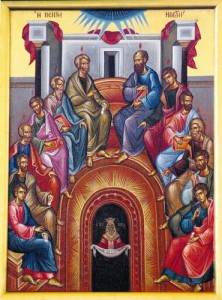The timing of this mission trip was based upon the Feast of Weeks, or in Hebrew “Shavuot”, or in Christian “Pentecost”. It’s funny that when we returned from The Land and told my Jewish brother that we celebrated Shavuot, he was surprised to hear that Christians celebrated this day. Soon after, Kara was telling her small group that we had celebrated Pentecost and her small group was surprised to hear that Jews celebrated Pentecost. The two are the exact same holiday, and since this isn’t well known, this might be a good place to explain it.

There are three main Jewish holidays or Feasts. There are other holidays, but these are the 3 main ones that God says to celebrate Him in the Bible: the Feast of Unleavened Bread which is tied to and just after Passover/”Pesach,” the Feast of Weeks, called “Shavuot”, and the Feast of Tabernacle, called “Sukkoth”. (noticeably absent is Christmas-although that’s a fun time to celebrate, too. But God never directed us to celebrate that day).
I don’t write this to say that you must celebrate these Feasts in order to get to Heaven, or in some way please God. Paul even admonished the Galatians for listening to those who would tell them that their forms of worship through certain days was what made them holy. (See Galatians 4:9-11, Romans 14:5-6, & Colossians 2:16-23) Also, please refer to a comment I made on April 4th to a post then.
Still, let’s look at these three holidays to see what God is showing us.
The Feast of Unleavened Bread is a celebration of the Passover when God killed the first born son of every family in Egypt, but spared the sons of Abraham. He did it in a very specific way. He told each family to kill a “perfect” lamb and to spread its blood on their doors. By the blood of this lamb, they were saved. (see Exodus 12:1-20) A millennium later, Jesus was sacrificed on this same Holy day. And by the blood of this lamb, we are saved! Thus the first feast, or Rehearsal as it is also called, which God ordained and is practiced yearly by the Jews in the physical world, was fulfilled in the spiritual world by God.
The Feast of Weeks, or “Shavuot” is a celebration that God commanded to commemorate God’s giving of the Law to Moses on Mt Sinai (see Exodus 19). This was a big deal. God had come down and told them exactly how they were to live their lives. Shavuot celebrates this special and holy occasion. Yet, later prophets foretold that a day would come when God would write His Law on the people’s hearts. (see Jeremiah 31:33 & Isaiah 51:6-8) This is exactly what happened – starting on Shavuot, the day we now call Pentecost. Jesus was killed and rose again at Passover and ministered for 40 days before telling the disciples to wait and pray until the Holy Spirit came. This was fulfilled (we’ll talk about what they would have been doing in an upcoming post) on Shavuot, which is always 50 days after Pesach and thus called “Pente-cost.” So on the same day that God gave the people His law, which showed them that they could not live up to His standards, He gave us His Holy Spirit, so we could be transformed more and more into His likeness because now we had the Law written on our hearts. Do you see what God is doing?
So what is the Feast of Tabernacles? It celebrates God “tabernacling” (being with – as in a tent) with His people while they were in the desert. It commemorates that fact that God lived with and amongst his people.
So, what do you think would fulfill, in the spiritual, what happened temporarily as a shadow in the physical long ago? (Zech. 14.16-21) Think about it.
I’ve only scratched the surface here, but if you find this discussion interesting, why not check out this document link (http://www.jezreel.org/PDF/FeastDays.pdf) for more info. Here are the first two paragraphs of that document:
“Just a moment,” someone will say “are not these Feasts all part of the old covenant? And as such, they have been fulfilled by Jesus and nailed to the cross at Calvary? They are, therefore, obsolete and it is no longer necessary for believers to observe them. Besides, are they not Jewish?”
Doubtless some of you may have heard these and similar statements. But are you sure they have the backing of Scripture? Have you examined the evidence to see if that is what the Bible says? Have you looked into the New Testament record to see what the early church did after the Saviour’s resurrection? Have you read the prophecies concerning the Renewed Covenant and the Feasts of Yahweh, prophecies identifying who the Renewed Covenant is made with and what’s new about it? Prophecies which tell of the coming millennium (the 1000 year Reign of Peace) when all the nations of the earth will obediently keep the Feasts? Have you considered that weighty Scripture which tells of the Sabbaths of Yahweh being observed for all eternity on the New Earth?
Photo credit: Exploring Orthodoxy
